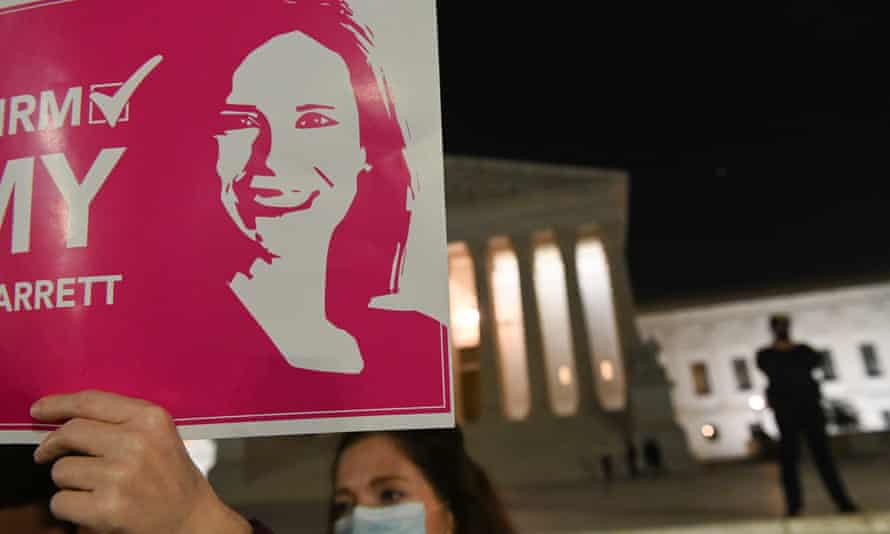US set for flurry of ‘Christian nationalist’ bills advanced by religious right
Legislation that would erode LGBTQ and reproductive rights expected to be introduced in states across America, experts warn

Donald Trump is set to leave the White House and Republicans are about to relinquish control of the Senate, but experts are warning the US is facing a wave of rightwing ‘Christian nationalist’ legislation in 2021, as the religious right aims to thrust Christianity into everyday American life.
With the supreme court now dominated by Trump-appointed conservative justices, elected officials in states across the country are set to introduce bills which would hack away at LGTBQ rights, reproductive rights, challenge the ability of couples to adopt children, and see religion forced into classrooms, according to a report by the American Atheists organization.
In recent years Republicans have sought to infuse religion into state politics across the country, many of the bills lifted from model legislation drafted by well-funded Christian lobbying organizations under an effort known as “Project Blitz”.
As the coronavirus pandemic hit the US 2020 proved a relatively quiet year for religious bills, but in 2021, the US could see Republicans make up for lost time.
“Very few bills managed to be pushed forward last year due to the pandemic,” said Alison Gill, vice-president for legal and policy at American Atheists, which seeks to protect the separation of church and state. “Those issues that are contentious in the culture war will continue to move forward this year, and will affect LGBTQ people, religious minorities, and non-religious people and women and reproductive access.”
Over the past five years a wave of discriminatory laws have been introduced in state legislatures, frequently in the name of Christianity. LGBTQ people, in particular, have been targeted, including efforts to prevent trans people using certain bathrooms, and to prevent LGBTQ couples from adopting children.
The danger isn’t just to people in individual states. With the supreme court now dominated 6-3 by conservatives, challenges to federal law could work their way to the highest court in the US, where decisions could enshrine discriminatory laws
Gill said that after Brett Kavanaugh was appointed to the court in 2018, some states pushed a flurry of reproductive rights laws which would limit women’s access to abortion. The Christian right could be further emboldened after Amy Coney Barrett’s controversial appointment to the supreme court in October.
“In a lot of ways, and I think the reproductive bills are a good example of this, they’re not just passing laws that do negative things, they’re trying to set up future cases that will then go before the court, that can be used to advance an agenda,” Gill said.
“It’s not just about the negative law itself.”
There have been multiple efforts to blend the separation of church and state in recent years, driven by Christian nationalists who believe America was established as, and should remain, a Christian country.
In 2019, Christian hardliners introduced bills in several American states which would see the phrase “In God we trust” displayed on public buildings, in schools and on public vehicles, including police cars. Six states – Louisiana, Arkansas, Tennessee, Florida, Alabama and Arizona – approved versions of this legislation, and it became law for every public school in those states to display the phrase.
A year earlier, Oklahoma passed an adoption law which allows private adoption agencies to turn away LGBTQ couples on religious grounds. It became the 10th state since 2015 to pass some form of the law, which allows child placement agencies to deny anyone who does not match their religious or moral beliefs, an investigation by the Center for Public Integrity found.
In most of these states, parts of the legislation had almost identical wording. That’s a result of Project Blitz, an effort by rightwing Christian organizations to push through bills furthering their aims.
Project Blitz provides draft legislation to lawmakers across the country. Frequently, that legislation is copied, pasted and presented in state capitols. In 2018, state lawmakers introduced 74 bills similar to Project Blitz draft legislation, according to America Atheists. The bills ranged “from measures designed to restrict same-sex marriage to allowing adoption agencies to deny placements because of religion”, American Atheists said.
The aim is also to stuff up state houses with legislation, drawing mostly Democratic legislators’ time and attention away from other issues.
“It’s kind of like whack-a-mole for the other side,” David Barton, founder of the Christian-right organization WallBuilders and one of four members of Project Blitz’s steering team, told state legislators in a call which was made public.
“It’ll drive ‘em crazy that they’ll have to divide their resources out in opposing this.”
Project Blitz, and much of the Christian nationalist legislation, has broader aims than just drawing time and serving as an irritant, however. Christian nationalists hope to pave the way for further attacks.
Katherine Stewart, a journalist and author of The Power Worshippers: Inside the Dangerous Rise of Religious Nationalism, said leaders behind Christian nationalists efforts “are playing a long and ambitious game”.
The people behind Christianity-based legislative efforts grouped their various efforts into three categories, according to how difficult they would be to pass, Stewart said, and each is part of a larger picture.
“The first category consisted of largely symbolic gestures, like resolutions to emblazon the motto ‘In God We Trust’ in public school classrooms,” Stewart said.
“But the point of phase one was to prepare the ground for phases two and three, which aimed to entangle government with their version of religion in deeper ways.
“Considered individually, these bills making their ways through state legislatures appear to have a scattershot quality. In reality, they are very often components of a coordinated, overarching strategy.”










